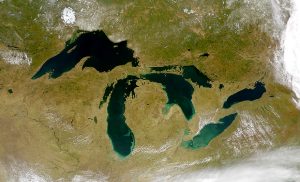How Might Courts Interpret the Great Lakes Compact?
When a coalition of environmental advocacy groups challenged the state of Wisconsin’s approval under the Great Lakes Compact of an out-of-basin water diversion to supply the Foxconn project, it came as no surprise to Peter Annin. “It’s not unexpected at all that there would eventually be legal challenges over the Great Lakes Compact,” Annin, the well-known Great Lakes journalist and author, said during an appearance last October at the  Law School’s Lubar Center. Like any other legal text, the Compact includes ambiguous terminology. For example, the Foxconn challenge centered on whether the application satisfied the Compact’s requirement that any out-of-basin diversion be for “public water supply purposes.” Annin predicted that the Compact’s meaning will be “refined” during such litigation, much as has happened with other important environmental laws such as the Clean Water Act or Clean Air Act.
Law School’s Lubar Center. Like any other legal text, the Compact includes ambiguous terminology. For example, the Foxconn challenge centered on whether the application satisfied the Compact’s requirement that any out-of-basin diversion be for “public water supply purposes.” Annin predicted that the Compact’s meaning will be “refined” during such litigation, much as has happened with other important environmental laws such as the Clean Water Act or Clean Air Act.
The Foxconn challenge made history as the first state-level legal challenge based on the Great Lakes Compact; an earlier objection to the Waukesha approval was heard by the Compact Council itself. The Foxconn case never made it all the way to court, however; it ended with an administrative ruling by Wisconsin Administrative Law Judge Brian K. Hayes upholding the diversion approval. The plaintiffs decided not to appeal the decision. As I explained in a previous post, the context of the “public water supply purposes” language admitted of two possible interpretations: that the proposed diversion would be used for “public water supply purposes,” or that the system requesting the diversion, taken as a whole, served “public water supply purposes.” ALJ Hayes adopted the latter, vindicating the position of the Wisconsin Department of Natural Resources. That decision—predicated on a textual analysis of the statute—is the primary takeaway from the case, and certainly important in its own right.
But other features of ALJ Hayes’ decision have been overlooked, and provide important clues about how future courts will interpret the Compact.

 This third and final post reflecting the “In Search of Better Outcomes” theme of the new Marquette Lawyer magazine begins with a third pair of articles, the one that actually provides the quoted phrase (see
This third and final post reflecting the “In Search of Better Outcomes” theme of the new Marquette Lawyer magazine begins with a third pair of articles, the one that actually provides the quoted phrase (see  Court to hear from former Chief Justice Asher Dan Grunis. Justice Grunis spoke to the students about the differences between the U.S. Supreme Court and the Israeli Supreme Court. The comparison in the annual caseload (about 70 cases in the U.S. versus 15,000 cases in Israel!) really stood out for the students. The court have 15 justices that generally sit in panels of three to hear the cases.
Court to hear from former Chief Justice Asher Dan Grunis. Justice Grunis spoke to the students about the differences between the U.S. Supreme Court and the Israeli Supreme Court. The comparison in the annual caseload (about 70 cases in the U.S. versus 15,000 cases in Israel!) really stood out for the students. The court have 15 justices that generally sit in panels of three to hear the cases.